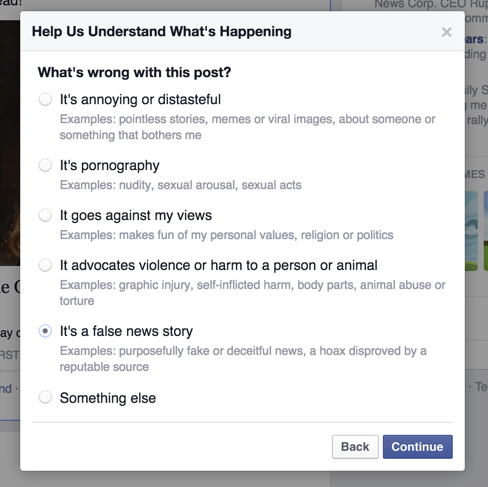Facebook has announced plans to crack down on spam and hoaxes in the newsfeed, with a note highlighting ‘false information’ when enough people flag the link as a hoax.
Facebook has announced plans to crack down on spam and hoaxes in the newsfeed, with a note highlighting ‘false information’ when enough people flag the link as a hoax.
The social network announced the planned changes in a blog post co-written by Software Engineer Erich Owens and Research Scientist Udi Weinsberg, who explained that Facebook users had told them they wanted to see less hoaxes and misleading news in their feeds.
Defining hoaxes, the pair stated that this would include “scams (‘click here to win a lifetime supply of coffee’)” and “deliberately misleading news stories (‘Man sees dinosaur on hike in Utah’)”. They will use a combination of user flagging and user deletion to determine what’s likely a hoax, resulting in news content displayed like this:
The post claims these are reliable metrics, as users are two times more likely to delete debunked hoax stories from their wall, while their friends are two and a half times more likely to report ‘deliberately misleading news’ as other types of posts. This step will now be made easier, as Facebook has added the option to highlight hoaxes as a reason for reporting:
Some have speculated that this approach to crowdsourcing news accuracy could lead to abuse, with Wired questioning what happens when Facebook users flag content that doesn’t match their political outlook.
There is also the question of what happens with satirical news sites. Will The Onion, say, be flagged as distributing hoax news stories? Facebook says no: “We’ve found from testing that people tend not to report satirical content intended to be humorous, or content that is clearly labeled as satire”
The Guardian notes that this move could be interpreted as the social network becoming less of a platform, and more of a publisher, however the site disputes this, explaining that “We are not removing stories people report as false and we are not reviewing content and making a determination on its accuracy.”
If you still struggle to spot a social networking scam when you see one, be sure to read We Live Security’s guide to spotting Facebook hoaxes.
Hadrian / Shutterstock.com









